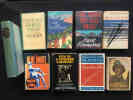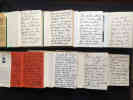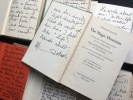187 books for « remarque erich maria »Edit
-
Type
Book (186)
Magazine (1)
-
Latest
Last 24h (3)
Last 3 days (3)
Last month (3)
-
Language
French (170)
Russian (17)
-
Century
20th (100)
21st (3)
-
Countries
Belgium (16)
France (153)
Germany (1)
United States of America (17)
-
Syndicate
ILAB (83)
SLAM (83)
Remarque Erich Maria. Trad. par Raoul Maillard et Christian Sauerwein
Reference : 73799
(1931)
Remarque Erich Maria Sauerwein Christian-Rodolphe
Reference : 37025VPSL
ISBN : B001BTPWZW
Erich Maria Remarque. Après eDer Weg zurücke. Traduit de l'allemand par Raoul Maillard et Christian Sauerwein. 119e édition
Gallimard Broché D'occasion état correct 01/01/1931 351 pages
A L'Ouest rien de nouveau. Traduit de l'allemand par Alair Hella et Olivier Bournac.
Paris, Flammarion, 15 avril 1932. Un volume, in-8, broché, couverture rempliée, 332 pp
Édition strictement limitée à 2.200 ex sur papier pur fil des papeteries Outhenin Chalandre. N° 592. Bel exemplaire en parfait état.* À l'ouest rien de nouveau (titre original allemand : Im Westen nichts Neues) est un roman de Erich Maria Remarque paru officiellement en 1929 mais paru pour la 1ère fois en 19282. Le roman décrit la Première Guerre mondiale vue par un jeune soldat volontaire allemand sur le front ouest3. Symbole du pacifisme allemand, le roman devient rapidement un succès de librairie et est suivi par d'autres romans de Remarque de la même veine, comme Après et Trois camarades. L'auteur, pourchassé dès 1930 par les militants nazis en raison de son pacifisme, émigre en Suisse, puis aux États-Unis. Son livre fut brûlé lors des autodafés en Allemagne nazie le 10 mai 1933, trois mois après leur accession au pouvoir. Photos sur demande.
DIS-MOI QUE TU M'AIMES.
Stock, 2002. In-8 broché, couverture illustrée, 268 pages, 16 planches de photos noir et blanc. Les lettres d'amour adressées par Remarque à Dietrich (les lettres de l'actrice ont été détruites par Paulette Goddard). Bel exemplaire. Nom à l'encre sur la garde.
Tous nos livres bénéficient d'une réduction de 50% (pour cause de départ à la retraite) jusqu'au 30 avril 2025
Après
Paris, Gallimard, (12 mai) 1931 1 vol. (160 x 210 mm) de 350 p. et [1] f. Demi-maroquin vert à coins, filets dorés sur les plats, dos à nerfs, titre doré, date en pied, tête dorée, couvertures et dos conservés (reliure signée de Duhayon). Édition originale de la traduction française. Un des 111 exemplaires réimposés sur vergé (n° XXVIII, spécialement imprimé pour le Dr. F. C. Ecot).
Fils d'un relieur, Remarque fait des études pour devenir instituteur lorsqu'il est appelé sous les drapeaux. Après la guerre, il exerce divers métiers : comptable, démarcheur, journaliste, rédacteur d'un journal sportif . C'est en 1929 que Remarque devient tout à coup célèbre, grâce à l'énorme succès remporté par son premier roman A l'Ouest rien de nouveau : traduit en vingt-cinq langues, l'ouvrage atteint en l'espace de dix-huit mois un tirage de 3,5 millions d'exemplaires ! Remarque s'installe ensuite en Suisse, à Ascona (1931), tandis que ses livres sont brûlés par les nazis (1933) et que la nationalité allemande est retirée. A partir de 1948, il réside alternativement à New York et en Suisse. Remarque situe ses romans dans les moments sombres qui ont marqué l'histoire de sa génération : la Première Guerre mondiale ( A l'ouest rien de nouveau ), les débuts troublés de la République de Weimar, dans Le chemin du retour [Der Weg zurück ,1931], la dépression économique et les années d'inflation, dans L'Obélisque noir [Der scharze Obelisk , 1956], l'émigration, dans Arc de triomphe(1946), la dictature hitlérienne, avec Le Temps de vivre et le temps de mourir (1654). Dans chaque situation, le romancier suit le destin d'individus qui cherchent à « se tirer d'affaire », à vaincre ce qu'ils considère comme une « mal-chance ». Les faiblesses (ou les recettes ?) de Remarque sont évidentes : intrigue policière réunissant des personnages contrastés, approche a-historique des évènements, mythologie des attitudes viriles (le camarade, le traître, le hors la loi, ...), philosophie anodine... On ne saurait néanmoins dénier à Remarque d'avoir dénoncé avec force, dans ses ouvrages, le militarisme, la guerre et la dictature. Premier titre paru de la collection Du monde entier, dont il ne sera plus tiré de réimposés in-4 Tellière par la suite.
Na zapadnom fronte bez peremen. In Russian /On the Western Front, No Change
"Short description: In Russian. Remarque, Erich Maria. On the Western Front Without Change. Moscow; Leningrad: The Land and the Factory, 1929 (Moscow: type. The image is provided for reference only. It may reflect condition of one of the available copies or only help in identifying the edition. Please feel free to contact us for a detailed description of the copies available. SKU9255662"
Na zapade bez peremen. In Russian /No Change in the West
Short description: In Russian. Remarque, Erich Maria. No Change in the West. Moscow: Moscow Worker, 1930. Please feel free to contact us for a detailed description of the copies available. SKU9255660
Film A l'OUEST RIEN de NOUVEAU, d'après le célèbre roman d'Erich Maria Remarque. Photographies tirées en héliograpvures du film réalisé sous la direction de Carl Leammle junior par Lewis Milestone. Préface de Henry de Jouvenel. Texte expolicatif du film par Pierre Chanlaine établi d'après l'édition française.
Paris, Tallandier (Collection "Ciné Or"), sans date, in 8° broché, 64 pages ; couverture illustrée.
...................... Photos sur demande ..........................


Phone number : 04 77 32 63 69
Der Weg Zurück
Propyläen 13,5 x 19,5 Berlin 1931 Petit in-8, reliure moderne demi-veau marbré à coins, dos à quatre nerfs orné de fleurons dorés, pièce de titre de cuir rouge, auteur et titre dorés, 368 p., couverture conservée. 151.- 175 Tausend. Frontkameraden, der Heimat wiedergegeben, suchen den neuen Weg ins Leben. Edition de l'année de l'édition originale du roman de l'allemand Erich Maria Remarque (1898-1970), qui dépeint les difficultés de réinsertion d'Ernst et de ses camarades au retour des tranchées, dans une Allemagne défaite. Belle reliure, couverture parfaitement conservée, très bon exemplaire.(ThBbis1) PHOTOS NUMERIQUES DISPONIBLES PAR EMAIL SUR SIMPLE DEMANDE-DIGITAL PHOTOGRAPS MAY BE AVAILABLE ON REQUEST
DIETRICH, Marlene - AUDEN,W. H., COWARD, Noël, HEMINGWAY, Ernest, MANN, Heinrich, MANN,Thomas, PAUSTOVSKY, Konstantin, REMARQUE, Erich Maria, RILKE, Rainer Maria, STERNBERG, Josef von.
Reference : 3758
(1960)
EXCEPTIONAL SET OF NINE BOOKS INCRIBED WITH MARLENE DIETRICH'S AUTOGRAPH SIGNED RECOLLECTIONS (two to four pages in length each) of her relationship with their authors :
Exceptional set of nine books inscribed with Marlene Dietrich’s autograph signed recollections (two to four pages in length each) of her relationship with their authors, each of whom has played a prominent role in Dietrich’s life, including former lovers, very close friends and writers whose works had made the most thorough impression on the actress. Each volume has been specially selected around the year 1979 by Dietrich among the books owned by a friend of hers. This set reflects in a unique way the passions of one of the most iconic actress of the twentieth century. - It includes: - 1. AUDEN (W. H. ). Collected Shorter Poems 1927-1957. New York, Random House, [1967]. Inscribed in black felt pen by Marlene Dietrich: « A true friend in special, difficult times ; also a favorite writer - although his style is so different from other great poets! Just shows you how varied my taste was, - and is! » - 2. COWARD (Noël). Pomp and Circumstance. Garden City, Doubleday, 1960. Inscribed in black felt pen by Marlene Dietrich: « When he introduced my performance at the “Café de Paris” in London it seemed to me as if a king had stepped down from his throne to help up a fallen commoner: We were friends for many, many years. Not even our travelling to many different countries could devide us! After his coming to rest in Switzerland I almost lived there between my professional escapades. I relied on his advice and I always felt guilty that I could do nothing in return. He insisted though, that my presence, near or far, had become a necessity for him, his mind, his phantasies! Maybe he made this up in order to minimize my guilt. I am grateful that I was not there when he died! My usual courage failed. » - 3. HEMINGWAY (Ernest). For whom the bell tolls. New York, Collectors Reprints, [1968]. Inscribed in black felt pen by Marlene Dietrich: « He wrote about me : “In this life Dietrich makes her own rules - but her own laws of decency and conduct in human behavior and relations are not less strict than the original ten.” This is one of the reasons he chose me to be his friend and intimate ». - 4. MANN (Heinrich). The Blue Angel. The novel by Heinrich Mann. The film by Josef von Sternberg. New York, Frederick Ungar, 1979. The volume includes The Blue Angel, English translation of Heinrich Mann’s Professor Unrat, and the English script of Der blaue Engel, its adaptation made by Josef von Sternberg. The book on which was based the movie to which Marlene Dietrich owned the iconic role which made her famous. Inscribed in black felt pen by Marlene Dietrich: « A sad man - living in the shadow of his famous, highly talented brother. He had a rare stream of contentment when his book “Professor Unrat” was chosen by Mr. von Sternberg for the first sound-film in Germany - as a vehicle for the famous star Emil Jannings. He felt very honoured and grateful to Mr. von Sternberg, and gave him “Plein-Pouvoir” to make all the changes he wanted - character and story changes. I never saw him again after the film called “BLUE ANGEL” was filmed in its final form, but I heard that he was not in the least upset regarding the drastic changes his book suffered in the version that made the film a lasting classic. - 5. MANN (Thomas). The Magic Mountain. Translated from the German by H. T. Lowe-Porter. With an introductory essay by the author. Illustrated with wood engravings by Felix Hoffmann. The Heritage Press, New York. Inscribed in black felt pen by Marlene Dietrich: “To read all the books written by Thomas Mann belonged to the higher education I received. I was fascinated by the “BUDDENBROCKS”, but the “MAGIC” of this book made me dizzy with admiration, or to use his words “light-hearted”! What he said of his hero I felt like “Life’s delicate child”. - 6. PAUSTOVSKY (Konstantin). Story of a Life. Childhood... Translated by Manya Harari and Michael Duncan. London, Harvill Press, 1964. Picture of Dietrich and Paustovsky at Moscow in 1964. Inscribed in black felt pen by Marlene Dietrich: « I am still on my knees at his feet like I was in Moscow when he came onto the stage at the end of my concert. I had read his books and found my own passions brilliantly described as his own! I had written to him long before I went on tour to Russia, but I never dreamt of meeting him - let alone feeling his hands touch mine! » - 7. REMARQUE (Erich Maria). All Quiet on the Western Front. Translated from the German by A.W. Wheen. New York, Grosset & Dunlap [reprint of the 1930 edition]. Picture of Dietrich and Remarque. Inscribed in black felt pen by Marlene Dietrich: « My great friend and “COMRADE IN ARMS”. Remember: his books were burnt at the historical “REICHTAGS-FIRE”. I arranged for his untroubled stay in America and it amused him when he caught me re-reading his books over and over again in the three languages I knew, “All quiet” and “The Road back” in particular. He was so full of complexes that I thought it my duty to eliminate at least some and I was proud when I succeeded. A sentimental gentleman he was. His favorite song: “Que reste-t-il de nos amours”. Also at the end of “All quiet on the Western Front” the Butterfly -. (Apart from the irony). He was a timid man and undemanding — Easy to live with. What a Loss! » - 8. RILKE (Rainer Maria). Translations from the Poetry of Rainer Maria Rilke by M.D. Herter Norton. New York, W.W. Norton, [1938]. Inscribed in black felt pen by Marlene Dietrich: « His is my God!! His writings, but especially his POEMS, ALL HIS POETRY helped me through the dark hours of life making my constant enthusiasm chase away all the melancholy my realism evokes daily. - I know all poems by heart and I take special delight in his unequaled choice of words and descriptions of his subjects, but also the “double-ryme” he invented - like a magician creating visual events and observations, rising out of the printed word, into living reality, right in front of your eyes! Sheer Delirium!! » - 9. STERNBERG (Josef von). Fun in a Chinese Laundry. New York, The Macmillan Company, [1965]. First edition of this autobiography, by the director who made Marlene Dietrich famous and made several of her greatest movies. Inscribed by Marlene Dietrich: « I quote the “FEMME FATALE” he made of me in Hollywood: “THE MAN I WANTED TO PLEASE MOST”. THERE I was alone - THERE he was the ultimate Tyrant at the studio. REASON: he knew about all the intricate parts of everything involved in Film-creation. Better than anybody - camera-men, lighting-men, (scriptwriters too) and he did not hide that fact! He had some patience with actors, but they hated him too: superiority is not easy to love. The INFERIORITY-COMPLEX, hidden in every human mind does not allow to love the man who knows all. - I am the exception to the rule! I loved him, I respected him, I bowed to his unusual behavior and I admired and worshipped his knowledge and wisdom. Both were the cause of his troubled existence. I cried a lot though! That’s when he said: “Everybody go to lunch Miss Dietrich is crying.” He did not pity me - then ».
More pictures on request.
A l'ouest rien de nouveau
Club Français du Livre 1954, in-8 relié 293 p. (très bon exemplaire) Tirage limité sur bon papier, maquette de Jacques Darche. La Grande Guerre vue du côté allemand ; un roman célèbre à juste titre, ici en édition club de qualité.
À l'Ouest, rien de nouveau.
Stock, 1929, in-12, 304 pp, traduit de l'allemand par Alzir Hella et Olivier Bournac, reliure demi-percaline gris-clair, dos lisse, pièce de ttre basane brune, fleuron et double filet dorés, couv. illustrée par Becan (Bernhard Khan) conservée (rel. de l'époque), dos lég. frotté, bon état. Édition originale sur papier courant
"Quand nous partons, nous ne sommes que de vulgaires soldats, maussades ou de bonne humeur et, quand nous arrivons dans la zone où commence le front, nous sommes devenus des hommes-bêtes." Témoignage d'un jeune soldat allemand de la guerre 1914-1918, À l'Ouest, rien de nouveau, roman pacifiste, réaliste et bouleversant, connut, dès sa parution en 1928, un succès mondial retentissant et reste l'un des ouvrages les plus remarquables sur la monstruosité de la guerre. Plus de glorification des faits d'armes, mais l'omniprésence de la mort et le tableau de l'Apocalypse. Le livre sera interdit en Allemagne. Il deviendra un film mythique, que les autorités allemandes essaieront de condamner également. Mais la puissance d'évocation de cette œuvre est telle qu'elle résiste à toute censure. Elle incarne si justement la bêtise et la cruauté infinies des hommes qu'on ne peut que penser au désastre des conflits suivants, à la marque indélébile laissée aux survivants. Écrit à la première personne, au présent, avec une sobriété qui souligne l'horreur quotidienne du front et de la vie dans les tranchées, ce roman nous interpelle du fin fend de l'enfer, dans la plus déchirante intimité.
Arc de triomphe. Nouvelle version française par Jeanne Thuot.
1948 New-York, Juan-les-Pins, Editions Méditerranéennes, 1948, fort in 8 broché, 531 pages
...................... Photos sur demande ..........................


Phone number : 04 77 32 63 69
Les camarades.
Couverture rigide. Reliure demi-basane à nerfs. 348 pages. Couverture conservée.
Livre. Traduction de Marcel Stora. Editions Gallimard, 1938.
A l'Ouest rien de nouveau.
Couverture souple. Broché. 303 pages.
Livre. Traduit par A. Hella et O. Bournac. Editions Stock, 1949.
A L'OUEST RIEN DE NOUVEAU.
Paris Flammarion, éditeur 1932 in 8 (20x14,5) 1 volume broché, couverture illustrée rempliée, 332 pages [1]. Traduit de l'allemand par Alzir Hella et Olivier Bournac. Tirage limité à 2200 exemplaires numérotés sur papier pur fil Outhenin Chalandre. Bel exemplaire ( Photographies sur demande / We can send pictures of this book on simple request )
Très bon
A l’ouest rien de nouveau
Club des éditeurs 15 octobre 1959, relié toile éditeur avec son rhodoïde, 224pp; traduction de Alzir Hella et Olivier Bournac avec des photographies hors texte - très bon état
Arc de triomphe - version française par Edouard Beique
Éditions méditerranéennes 1947 in8. 1947. Broché.
couverture défraîchie charnières fragilies intérieur propre
L'étincelle de vie. Roman traduit de l'allemand par Michel TOURNIER.
Paris, Librairie Plon, Collection " Feux croisés, Ames et Terres étrangères ", 1953. In-8, broché, II pp (Notice biographique)-339 pp.
Première édition. Bel exemplaire. Photos sur demande.
Après. Der Weg Zurück. Traduit de l'Allemand par Raoul Maillard et Christian Sauerwein
1931 Paris, Gallimard, 12 mai 1931, in-12 de 350-(2) pp., reliure de l'époque de demi-chagrin noir à coins, dos lisse orné de 4 liserés de chagrin vert, bon exemplaire.
A L'Ouest rien de nouveau
Paris Le Livre De Poche 1988 in-12° Poche n° 197.Traduction de l'allemand par Alzir Hella et Olivier Bournac . ( Commandez plusieurs livres dans notre librairie pour un seul frais de port compté ) . Roman . Histoire 1° Guerre Mondiale . - 288 p. , 250 gr.
Couverture souple Très Bon État .
 Write to the booksellers
Write to the booksellers















